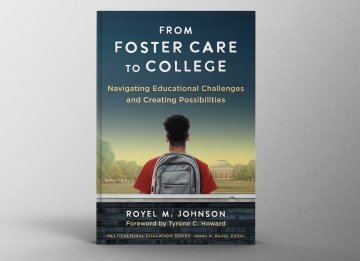
USC Rossier Associate Professor Royel Johnson discusses his new book, From Foster Care to College, which sheds light on the often-overlooked journeys of youth in the foster care system. Johnson explores the challenges and triumphs faced by those navigating a path to higher education. Blending personal anecdotes with practical advice, his book aims to inspire not only foster youth but also educators, policymakers and anyone committed to making a difference in the lives of young people. The Q&A delves into the author’s motivations, insights and the transformative power of education.
Can you share the most significant challenges young people with foster care experience face in transitioning to college, and how have these insights shaped the narrative of your book?
Young people in foster care encounter a wide range of barriers that limit college-going, from basic needs insecurity—like housing and food—to a lack of support networks and persistent stigma. Despite the compounded challenges and the shortcomings of social systems meant to help them, many youth in care defy the odds, pursuing college as a pathway to self-empowerment and stability. This book captures the often-overlooked resilience in these young people, sharing the stories of 49 individuals who have risen above systemic and personal obstacles to pursue their educational dreams.
In writing this book, what patterns or insights did you uncover about the foster care system that are essential for educators and policymakers to understand?
Several critical patterns emerged. First, young people in foster care often experience frequent school changes due to residential placement shifts, which disrupts their learning, affects relationships with educators and limits consistent access to resources. Second, while many states have extended support beyond age 18, the reality is that transitioning out of foster care at this critical juncture presents significant challenges, especially when preparing for college.
The fact that these young people must exhibit remarkable resilience to overcome these obstacles is inspiring but also highlights a systemic issue. Educators and policymakers have an institutional responsibility to smooth this path and eliminate barriers. My book provides a roadmap, detailing how comprehensive, trauma-informed support can make a transformative difference in the educational journeys of young people in foster care.
How do you hope your book will influence young people with foster care experience considering college, and what advice would you offer them based on your research and experiences?
I want this book to empower young people with foster care experience, helping them recognize their life experiences as powerful assets. College can feel daunting, especially when navigating it alone, but the resilience and adaptability they’ve developed are strengths that can serve them well. I hope it’s clear to readers that a lot of thought and care went into crafting this book, so they feel validated and see their own stories reflected in its pages.
For educators and decision-makers, I want this book to go beyond simply informing—it should inspire concrete action. My goal is for them to recognize the critical role they play within their spheres of influence, whether through policy shifts, resource allocation or creating community. By addressing the material needs of these young people and creating room for their success, they can help foster environments that truly support and honor the potential within foster youth, driving lasting, positive change.





